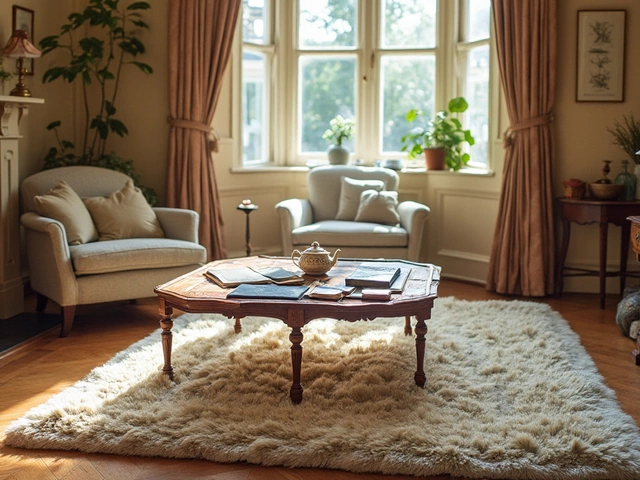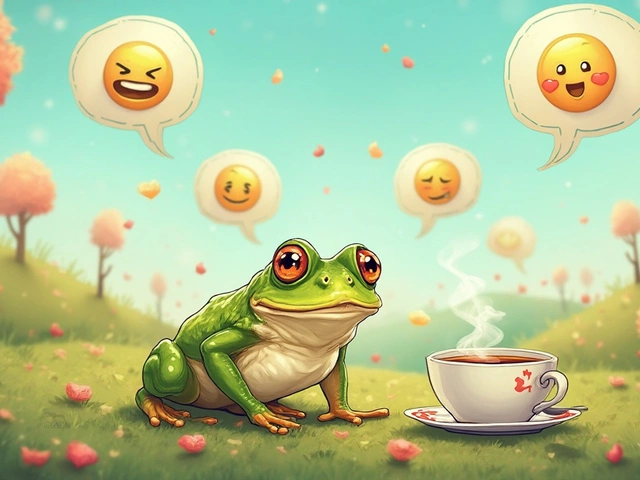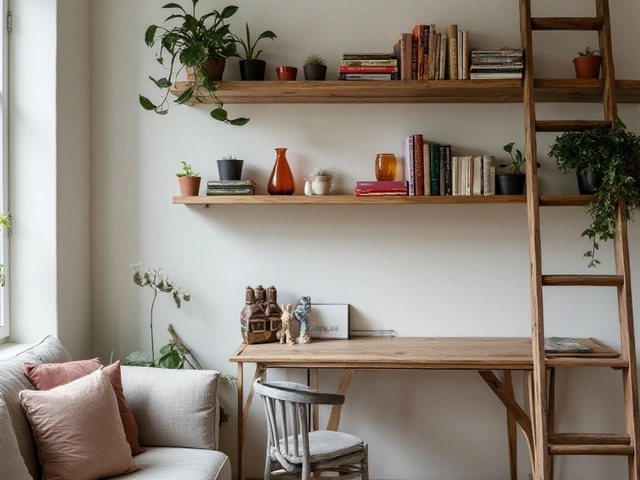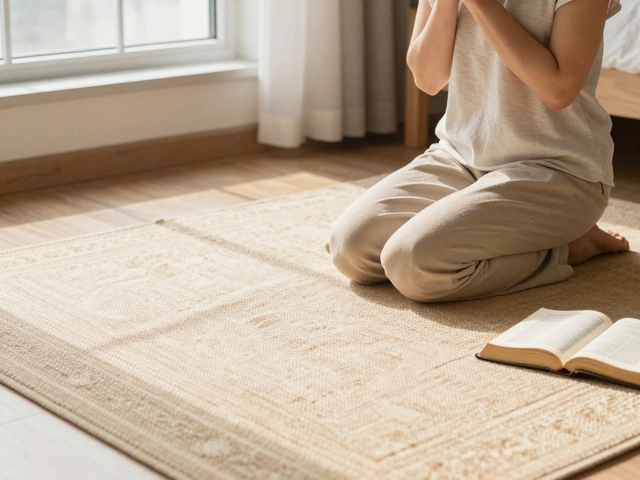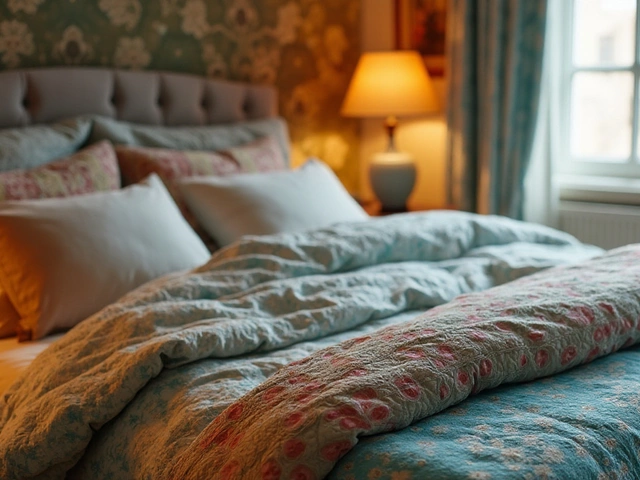Which Room to Declutter First? A Practical Guide to Starting Your Clutter-Free Home
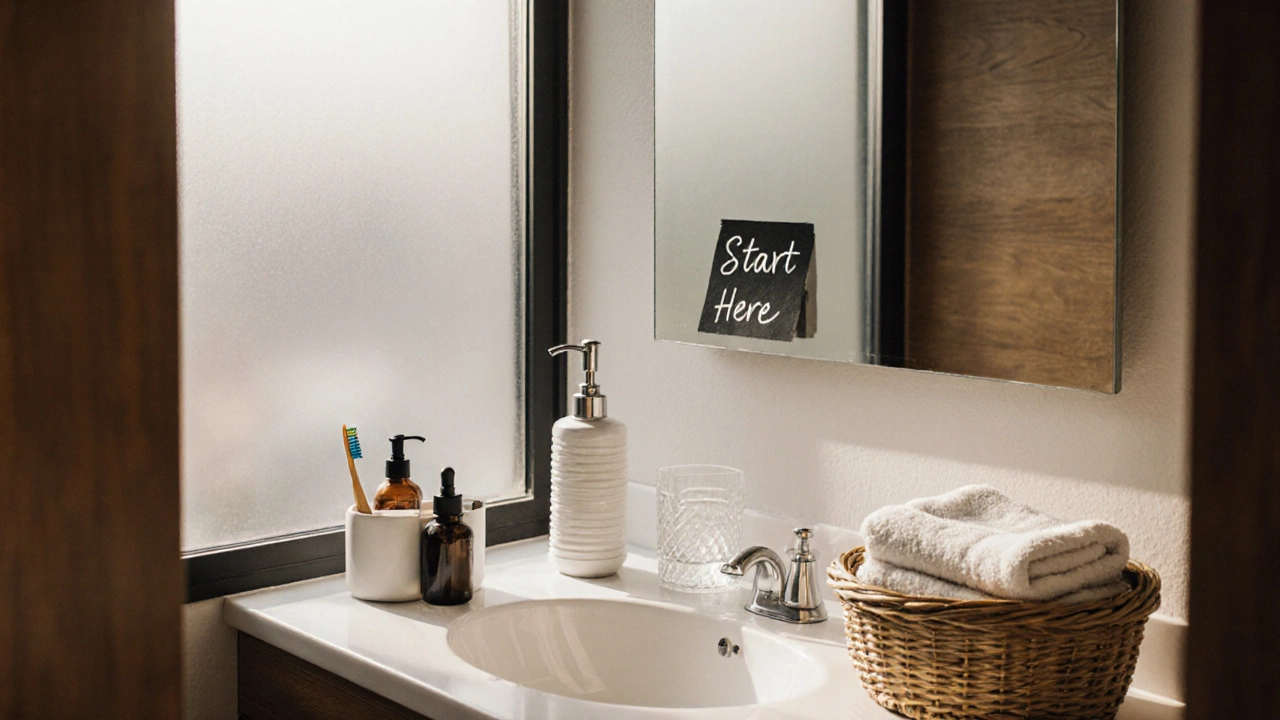
Decluttering Room Selector
Find Your Perfect Starting Point
Based on the article's research, we'll help you choose which room to declutter first for maximum success.
Where do you start when your house feels like a warehouse of stuff you don’t need? The answer isn’t random. It’s not about the biggest room or the messiest corner. It’s about where decluttering will give you the biggest win-fast. And that’s not just about space. It’s about momentum. The right room to tackle first turns overwhelm into progress.
Start with the bathroom
The bathroom is the easiest place to see immediate results. It’s small, contained, and full of expired items. Think about it: half-used shampoos from 2022, old makeup that’s gone gritty, unused travel-sized toiletries you forgot you bought. These aren’t just clutter-they’re health hazards. Expired medications, moldy loofahs, and rancid lotions don’t belong in your personal space.
Grab a bin. Put everything in it. Then sort: keep, toss, donate. You’ll be shocked how many bottles are past their use-by date. Most skincare products last 6-12 months after opening. Toothpaste? 2 years max. Medicines? Never use past the expiration. In New Zealand, Pharmac even reminds people to return old meds to pharmacies for safe disposal.
Once you clear the cabinet, you’ll find space for things you actually use. A simple drawer divider for hair tools. A basket for towels. A small shelf for daily essentials. You’ll walk in and feel calm. That’s the first win. And it takes less than an hour.
Why the bathroom beats the bedroom
Most people think: ‘I’ll start with the bedroom-it’s where I spend the most time.’ But bedrooms are emotional. Clothes hold memories. That sweater from your wedding trip? You haven’t worn it in five years, but letting go feels like losing a piece of yourself. Decluttering here is slow, heavy work.
The bathroom has no emotional baggage. It’s purely functional. You don’t cry over an old bottle of conditioner. You just throw it out. That’s why the bathroom gives you quick wins. And quick wins build confidence. You finish the bathroom, feel proud, and think: ‘If I can do that, I can do the rest.’
Next: the kitchen
After the bathroom, head to the kitchen. Not the whole thing. Start with the pantry and the junk drawer. These are the black holes of your home.
In the pantry, you’ll find canned goods from 2021, duplicate spice jars, and that bag of quinoa you bought ‘to be healthy’ but never used. Check expiry dates. If it’s been sitting there for more than a year, it’s not a backup-it’s clutter. Keep only what you’ve used in the last six months. If you haven’t cooked with it, you don’t need it.
The junk drawer? Empty it onto the counter. Sort into categories: batteries, tape, scissors, random cables, rubber bands, broken pens. Toss the broken stuff. Group what’s left. Put each group in small containers. A pill bottle for rubber bands. A mint tin for screws. A pencil holder for tape. Now it’s organized, not chaotic.
When you’re done, you’ll know exactly where your kitchen tools are. No more digging. No more frustration. That’s the power of small wins.
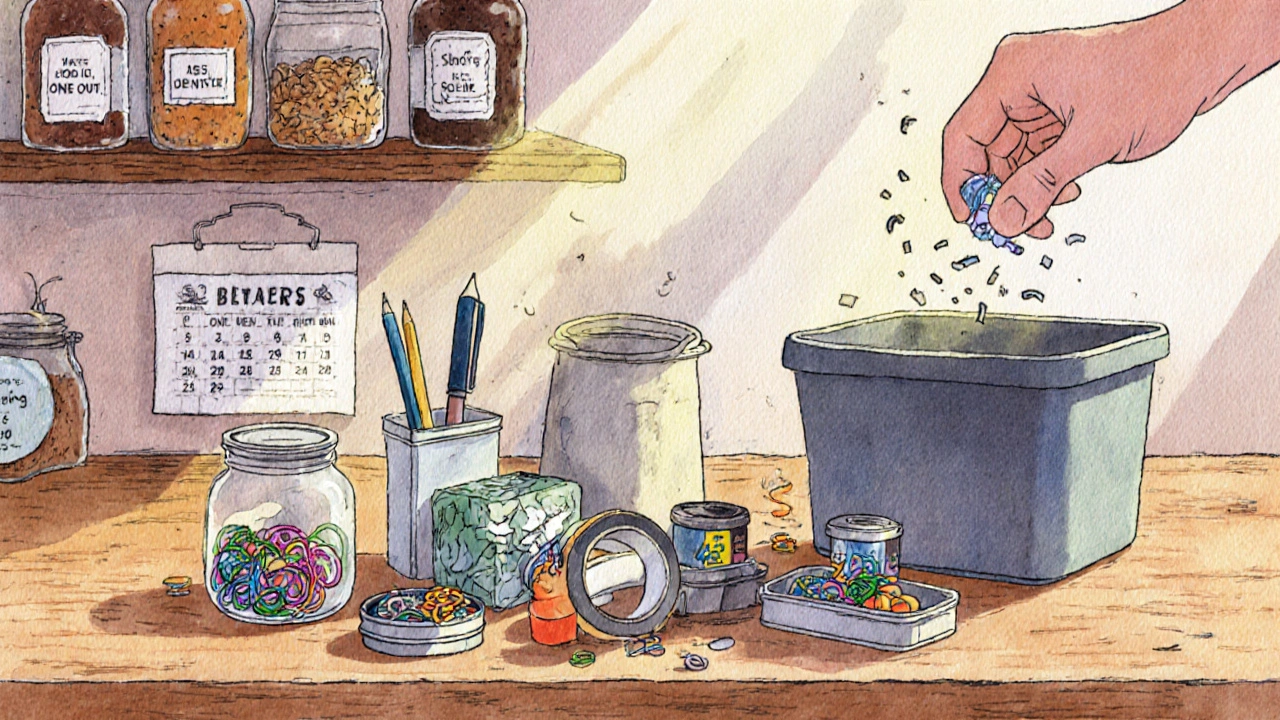
Why not start with the living room?
The living room looks messy, but it’s often just a staging area. Books, remote controls, kids’ toys, blankets, mail-it’s not storage, it’s transit. Decluttering here feels like rearranging deck chairs on the Titanic. You clean it up, and three days later, it’s back to normal.
Before you touch the living room, fix the places where stuff accumulates permanently. That means the bathroom and kitchen first. Once those are under control, the living room becomes easier to manage because you’ve built the habit of asking: ‘Do I use this? Do I love this? Do I need it?’
What about the garage or basement?
Don’t even think about it yet. Garages and basements are traps. They’re big, dark, and full of ‘someday’ items. That lawnmower you haven’t used in three years? The boxes labeled ‘Christmas decorations’ that have been there since 2019? They’re not storage-they’re emotional anchors.
Trying to tackle these spaces first leads to burnout. You spend a weekend sweating over boxes, feel defeated, and quit. That’s why professionals never recommend starting there. You need to prove to yourself that you can make progress before you face the big stuff.
What you’ll gain beyond space
Decluttering isn’t just about cleaning. It’s about resetting your brain. When your environment is clear, your mind feels lighter. Studies from Princeton University show that clutter competes for your attention, reducing focus and increasing stress. That’s why people feel calmer after a simple declutter.
After you finish the bathroom and kitchen, you’ll notice things:
- You spend less time searching for things
- You feel more in control of your day
- You stop buying duplicates because you know what you already have
- You start saying ‘no’ to more stuff
These aren’t side effects. They’re the real goal. You’re not just organizing your home-you’re changing how you relate to possessions.
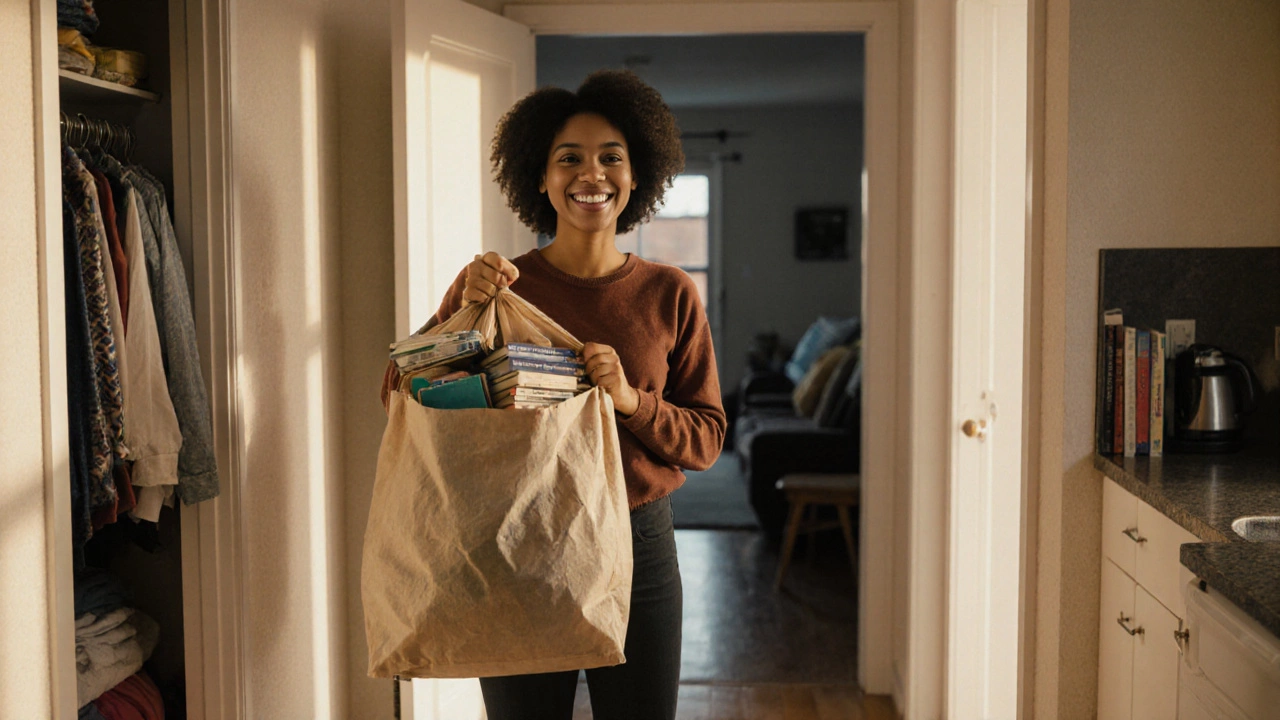
How to keep it clean
Decluttering once isn’t enough. You need systems.
For the bathroom: Every month, do a 10-minute wipe-down and check for expired products. If it’s been sitting there since last season, toss it.
For the kitchen: When you buy something new, throw out the oldest version. No exceptions. If you buy a new spice, the old one goes in the compost.
Use the ‘one in, one out’ rule everywhere. Buy a new shirt? Donate one. Get a new book? Give away an old one. It’s simple. It’s sustainable.
Common mistakes to avoid
- Don’t try to do it all in one day. You’ll quit.
- Don’t use storage bins to hide clutter. Bins aren’t magic. If you don’t use it, putting it in a bin doesn’t make it useful.
- Don’t wait for the ‘perfect day.’ Do it after dinner. Do it before your coffee. Do it when you have 20 minutes.
- Don’t listen to the guilt. ‘I paid good money for this.’ So did I. That doesn’t mean I have to keep it.
Clutter isn’t a moral failure. It’s a habit. And habits can be changed.
What to do next
After the bathroom and kitchen, move to your home office or laundry room. These are the next most functional spaces. Then, tackle your closet. Clothes are emotional, but now you’ve built the skill to let go.
By the time you get to the living room or garage, you won’t see it as a monster. You’ll see it as a project you’re ready for.
Start small. Win fast. Keep going.
What if I don’t have a bathroom or kitchen I can declutter?
If you live in a studio or shared space, focus on your personal zone-the area you use daily. That could be your nightstand, your desk, or your corner of the kitchen counter. The goal isn’t the room-it’s the habit. Clear one small area, and you’ll build the confidence to do more.
How long should a decluttering session last?
Start with 15 to 20 minutes. That’s long enough to make progress, short enough to avoid burnout. Set a timer. When it goes off, stop-even if you’re not done. You’ll come back tomorrow. Consistency beats marathon sessions.
Should I donate or throw away items?
Donate what’s clean, usable, and in good condition-clothes, books, kitchen tools. Toss broken, expired, or unsanitary items-old makeup, moldy sponges, chipped mugs. In Auckland, Salvation Army and local op-shops take donations on weekdays. For hazardous waste like batteries or paint, use your council’s drop-off points.
What if my family resists decluttering?
Don’t force it. Start with your own space. Let them see the difference. When they notice you’re calmer, more organized, and less stressed, they’ll ask how you did it. Lead by example. People follow action, not instructions.
Is there a best time of year to declutter?
There’s no perfect season. But many people find spring or autumn helpful because of the natural shift in routine. In New Zealand, the end of summer (March) is great-before the holidays, when you’re not buried in gifts. But honestly? The best time is now. Today. Right after you finish reading this.

